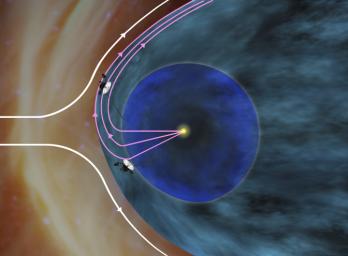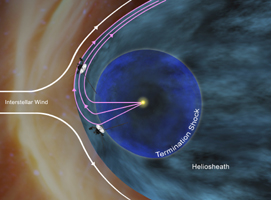
|
The Sun’s Southern Wind Flows Northward (Artist’s Concept)
- Click the image above for a larger view
- Full-Res JPEG (2006 x 1479) (151.9 kB)
- Full-Res TIFF (2006 x 1479) (8.9 MB)
Caption:

Annotated Version
Click on the image for larger annotated version
This artist's concept shows how NASA's Voyager 1 spacecraft is bathed in solar wind from the southern hemisphere flowing northward. This phenomenon creates a layer just inside the outer boundary of the heliosphere, the giant bubble of solar ions surrounding the sun. If the outside pressure were symmetrical, the streams from the sun's northern hemisphere above the plane of the planets would all turn northward and the streams from the southern hemisphere would all turn southward.
However, the interstellar magnetic field presses more strongly on the boundary in the southern hemisphere, forcing some of the solar wind from the south that otherwise would have gone southward to be deflected northward to where Voyager 1 is. On July 21, 2012, the magnetometer instrument indicated that Voyager 1 had entered a region where the wind is from the southern hemisphere. Scientists interpret this to mean that the spacecraft is in the final region before reaching interstellar space because the southern wind streams have to flow out and around all of the northern wind to reach Voyager 1's location.
Background Info:
The Voyager spacecraft were built and continue to be operated by NASA's Jet Propulsion Laboratory, in Pasadena, Calif. Caltech manages JPL for NASA. The Voyager missions are a part of NASA's Heliophysics System Observatory, sponsored by the Heliophysics Division of the Science Mission Directorate at NASA Headquarters in Washington.
For more information about the Voyager spacecraft, visit:
http://www.nasa.gov/voyager
and
http://voyager.jpl.nasa.gov
.
Cataloging Keywords:
| Name | Value | Additional Values |
|---|---|---|
| Target | Heliosphere | |
| System | Solar System | |
| Target Type | Heliosphere | |
| Mission | Voyager | |
| Instrument Host | Voyager 1 | |
| Host Type | Flyby Spacecraft | |
| Instrument | Magnetometer | |
| Detector | ||
| Extra Keywords | Artwork, Color, Magnetosphere | |
| Acquisition Date | ||
| Release Date | 2012-12-03 | |
| Date in Caption | 2012-07-21 | |
| Image Credit | NASA/JPL-Caltech | |
| Source | photojournal.jpl.nasa.gov/catalog/PIA16482 | |
| Identifier | PIA16482 | |
